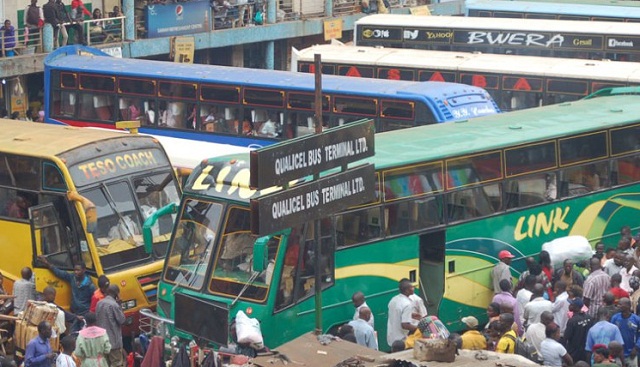
Kampala, Uganda | THE INDEPENDENT | Buses plying the Kampala-Bwera route have taken no initiative to address the threat that the deadly Ebola virus presents to them, their passengers and family members. Passengers on the bus spend their time on phones, sleeping or watching music videos on the small 6-inch television screen on the bus.
They are entertained by Music videos in Swahili, English, Luganda and Lingala. None of the passengers or even transporters seems bothered by the news from their destination, where two people have already succumbed to the deadly Ebola virus.
The case is not any different within Kasese town. No kind of Ebola information is available for passengers in the taxi or bus parks. It is business as usual; people freely walk in and out of the taxi, shaking hands with familiar faces, friends and family, and rubbing shoulders with unknown neighbours.
The screening is only done at the border, to people crossing into Uganda from the Democratic Republic of Congo, where more than 1,000 lives have been lost. There is no screening in the communities, the parks, schools and Churches, where multitudes meet every day. However, the Ministry of Health has banned all forms of gathering within Kasese district.
The same is happening in Kampala where multitudes are arriving every day from Kasese district. They scatter as soon as they enter the city, a scenario which could pose a great risk to persons they eventually come in contact with, in the event that they have picked the deadly virus.
Wilson Makanga, a passenger, arrived in Kampala this afternoon alongside 60 others aboard Pokopoko Bus from Bwera. He says they all dispersed into the crowds in Kisenyi area without any screening or measures to detect infections of any kind.
Makanga says that he was in a panic on what could happen if in the worst case scenario, an Ebola victim had found his way to the bus. “We were never screened on boarding the bus, I think this is an oversight by the health officials.”
Makanga argues that It is easier to screen people before they board and as they board off than risking a suspected case to mingle within the high populated Kampala city. A random survey by Uganda Radio Network also established that a number of bus drivers and oblivious of the different Ebola preparedness and response steps. Pokopoko, Link, Baby Coach and Kalita Buses are all plying the Kampala-Bwera route, but none of their people knows what is needed to prevent or control the spread of Ebola.
Shafiq Kigozi, the Baby Coach Manager at Kisenyi Bus Terminal says he is aware of the outbreak of the epidemic in Kasese but hastens to add that since they had the announcement on the radio, they have stopped allowing dirty passengers to board the bus. He adds for Baby Coach, all conductors and turn-boys have been given gloves to avoid direct contact to notes given to them by passengers.
The Ebola virus disease is a rare but severe, often fatal illness transmitted to people from wild animals and spreads in the human population through broken skin or mucous membranes. Experts say that Ebola spreads faster through contact with the Blood or body fluids of a person who is sick with or has died from Ebola, objects that have been contaminated with body fluids from a sick person or human-to-human physical contact.
Julius Bachwa, one of the transport managers at Pokopoko buses says they have no capacity to handle emergencies of the Ebola nature. He called upon the ministry to upscale their activities to cover the transport sector.
More than 25 contacts of the victims have been identified so far after the spillover of the epidemic to the Ugandan side after months of ravaging communities in the Democratic Republic of Congo, where 2,025 Ebola cases and 1,357 deaths have been recorded.
Sarah Opendi, the State Minister for Health says that the ministry is currently on top of the situation asking the public to remain calm and follow the guidelines issued through radio adverts.
She adds that the ministry will continue screening all people entering Uganda at all border posts regardless of their means of transport.
Today, the World Health Organization convened a meeting of its International Health Regulations Emergency Committee at its headquarters in Geneva, with expectations it will declare the Ebola outbreak to be what is known as a public health emergency of international concern.
That declaration would trigger a far more aggressive response to combat the outbreak, which could lead to more stringent border controls and other travel restrictions.
*****
URN
 The Independent Uganda: You get the Truth we Pay the Price
The Independent Uganda: You get the Truth we Pay the Price



